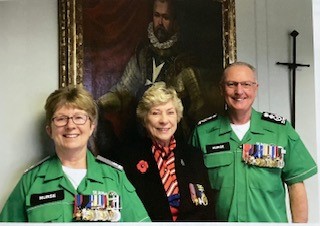The History of the Welsh Branch
The Beginning
The Welsh branch held its inaugural meeting on the 20th April 1968, at Ty Maeth the home of the Welsh Board of the Royal College of Nursing. There were 14 members in attendance, comprising of serving and retired personnel and members of Territorial Army Voluntary Reserve (TAVR). During this meeting, the name of the branch was agreed as “The Welsh Branch of the QARANC Association”. Publicity, finance details and future meetings were discussed with the initial funding provided by a £10 loan from QARANC Association HQ, the Commanding Officer of 203 (Welsh) General Hospital TAVR offered the hospitality of the Territorial Army Centre at Llandaff for future branch meetings. Today, we proudly continue our close relationship with 203 (Welsh) Multi-Role Medical Regiment with many present and past personnel being members of the branch.
This section will continue to be updated in future website updates.
Membership
Within the Welsh Branch, we have 3 serving or retired reservist nurses who hold the Royal Red Cross (RRC) and Order of St John (OStJ). The Royal Red Cross medal (or more accurately decoration) was introduced to Military Nursing by Royal Warrant by Queen Victoria on 23rd April in 1883 which was St George's Day. The decoration is awarded to army nurses for exceptional services, devotion to duty and professional competence in British Military Nursing.

(L to R) Lt Col Caroline Whittaker, Lt Col Marilyn Williams and Col Kevin Davies
Communications with branch members
Given the wide geographical spread of our members, not everyone can attend in-person events. In the spirit of Friendship, we host both in-person and online gatherings, with technology enabling us to stay connected wherever we are.
Our Annual General Meetings, for instance are often held via Zoom. Filled with laughter, shared stories and a strong sense of community
The committee continues to support members throughout the year with face to face visits, flowers, phone calls, emails etc, as necessary. Many of our older members live alone or face health challenge and, maintaining regular contact with them remains one of our core commitments reflecting the Corps main aims of “caring for each other” and has been much appreciated by members concerned.